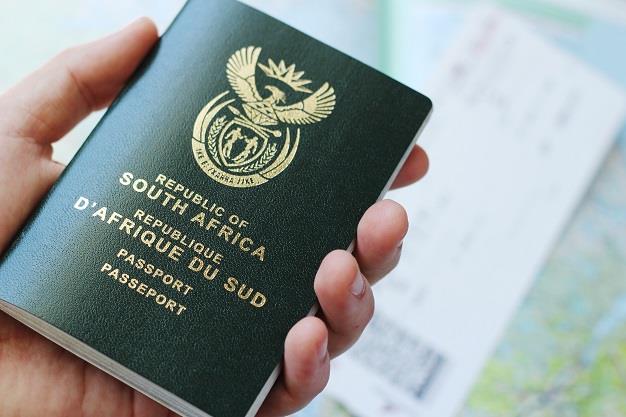The African Union Passport, currently only available to government leaders, diplomats and AU officials, is set to be rolled out fully in 2021 following delays due to the Covid-19 pandemic.

The passport is expected to ease travel within the continent and is crucial for the success of African Continental Free Trade Area (AfCFTA), says Justice Malala in his analysis of Migration in Africa, as part of the Henley Global Mobility Report 2021.
READ: SADC outlook | Namibia's Walvis Bay in high demand, eSwatini hits super-buyer's market
The AfCFTA aims to bring together 1.3 billion people in a $3.4 trillion economic bloc, creating a single market for goods and services in addition to a customs union with free movement of both capital and business travellers.
Visa-free Africa
The passport forms part of the AU's Agenda 2063, for an ‘integrated continent, politically united and based on the ideals of Pan-Africanism and the vision of Africa’s Renaissance’. The initiative aims at transforming Africa’s laws, which remain generally restrictive on the movement of people despite political commitments to bring down borders with the view to promoting the issuance of visas by member states to enhance free movement of all African citizens in all African countries.
The Free movement of persons in Africa is expected to deliver several key benefits for all participating countries, including South Africa, such as:
- Boosting intra-Africa trade, commerce and tourism;
- Facilitating labour mobility, intra-Africa knowledge and skills transfer;
- Promoting pan-African identity, social integration and tourism;
- Improving trans-border infrastructure and shared development;
- Fostering a comprehensive approach to border management;
- Promoting rule of law, human rights, and public health.
The roll-out of the passport comes as the number of South African, high-net-worth individuals leaving the country grows, driving a surge in second passport applications. National lockdowns, closed borders and travel restrictions continue to drive up enquiries for second passports, citizenships and overseas residencies - by more than 50% year-on-year - with passport power becoming an increasing necessity in a pandemic-hit world.
READ: The Great Dispersion | Second passport demand surges by 50%
deVere Group, which has more than 100,000 clients globally, reports that this highly unusual year has seen demand for its residency and citizen service “skyrocket”, says Nigel Green, the founder and CEO of deVere Group.
"The majority of enquiries are from high–net-worth individuals from the US, India, South Africa, Russia, the Middle East and East Asia who are seeking alternative options in Europe and the Commonwealth. Whether it be for personal reasons, such as to remain with loved ones overseas or be able to visit them, or for business reasons, a growing number of people are seeking ways to secure their freedom of movement as they have faced travel restrictions which are, typically, based on citizenship,” says Green.
Without taking temporary restrictions into account, Japan continues to hold the number one position on the Henleys Passport Index, with passport holders able to access 191 destinations around the world visa-free.
This marks the third consecutive year that Japan has held the top spot, either alone or jointly with Singapore. Asia Pacific (APAC) region countries’ dominance of the index - based on data from the International Air Transport Association (IATA) — now seems firmly established. Singapore sits in 2nd position, with access to 190 destinations, and South Korea holds onto 3rd place alongside Germany, with both having a visa-free/visa-on-arrival score of 189. Slightly further down but still in the top 10, New Zealand is in 7th position, with visa-free access to 185 destinations, while Australia is in 8th position, with access to 184 destinations.
READ | South Africans are using this visa to gain access to the US and 142 other countries
South Africa's ranks 54th at present with access to 101 countries - which could increase going forward with the AU Passport set to ease travel restrictions across 55 pan-African states.
With the US and the UK still facing significant challenges related to the virus, and the passport strength of both countries continuing to steadily erode, the balance of power is shifting. Over the past seven years, the US passport has fallen from the number one spot to 7th place, a position it currently shares with the UK. Due to pandemic-related travel constraints, travelers from both the UK and the US currently face major restrictions from over 105 countries, with US passport holders able to travel to fewer than 75 destinations, while UK passport holders currently have access to fewer than 70.
READ: Global cost of the property market | SA ranks as one of the most affordable
“Just a year ago all indications were that the rates of global mobility would continue to rise, that travel freedom would increase, and that holders of powerful passports would enjoy more access than ever before. The global lockdown negated these glowing projections, and as restrictions begin to lift, the results from the latest index are a reminder of what passport power really means in a world upended by the pandemic.”
Amid these dynamic shifts, the appeal of investment migration remains constant, with countries offering residence and citizenship programs continuing to fare extremely well on the index, says Henley & Partners’ CEO Dr Juerg Steffen.
"The volatility driven by Covid-19 has pushed the steadily growing appeal of investment migration into overdrive. More than being associated with simple ease of travel or acquiring a vacation home, alternative residence and citizenship are now also perceived in terms of their remarkable potential for portfolio diversification, access to global investment and operations, and the creation of a new inheritance and identity for the family.
"Investment migration is now a standard consideration for international families and entrepreneurs who are looking to hedge volatility and create long-term value through enhanced global mobility.”








